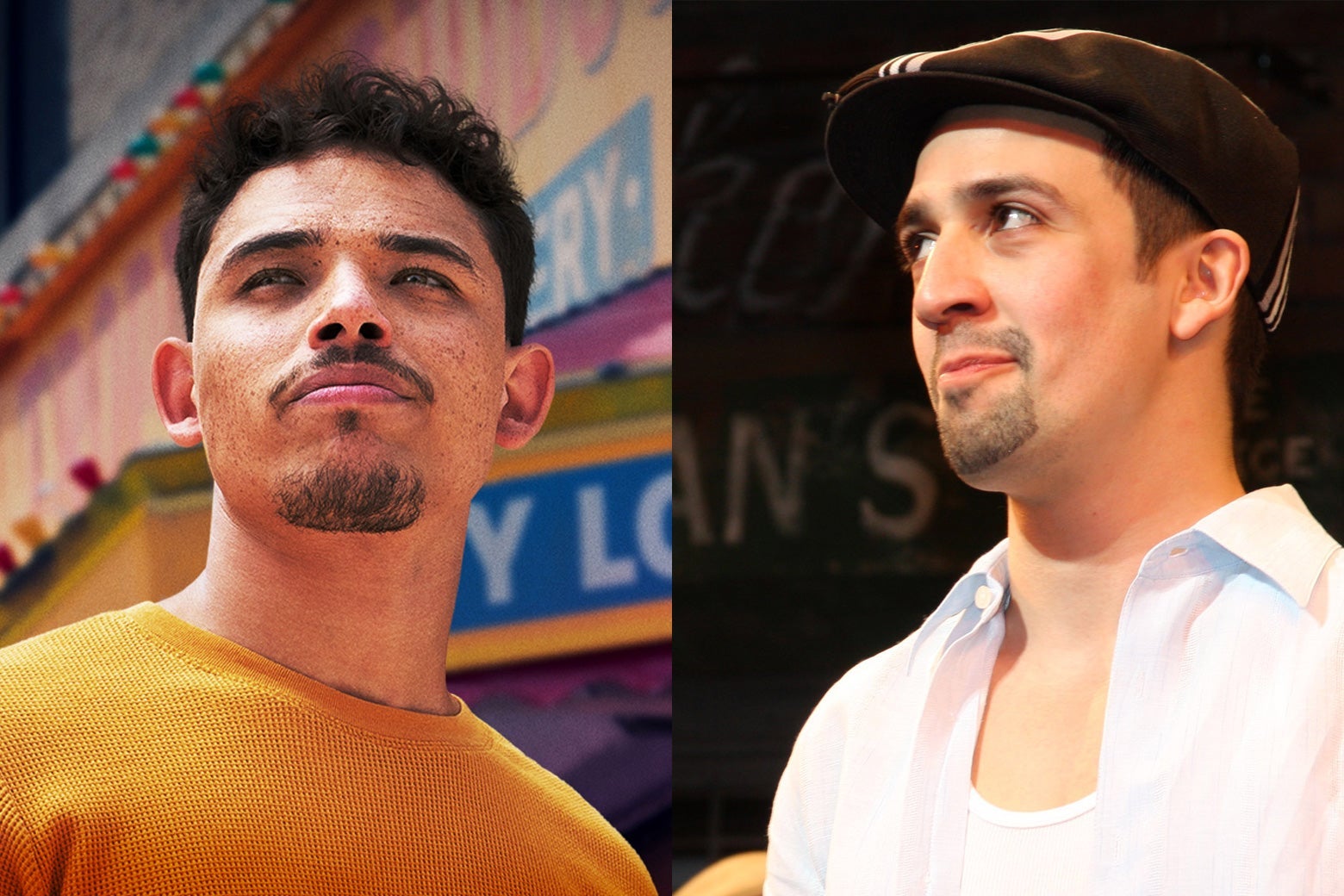Almost a year after it was originally scheduled for release, the movie adaptation of In the Heights is here at last. The original musical, with music and lyrics by Lin-Manuel Miranda and a book by Quiara Alegría Hudes, ran on Broadway from 2008 to 2011. Now, it’s on the big screen and on HBO Max, in a film adaptation from Hudes (now serving as screenwriter) and director Jon M. Chu—and that means changes. The film flips the order of some scenes and songs while cutting others entirely. (Sorry, “Inútil,” but apparently the filmmakers thought you lived up to your name.) Below, we’ve rounded up the biggest differences in the transition from stage to screen, in spoiler-y detail.
The Frame Story
The movie begins with Usnavi, played by Anthony Ramos, sitting on a beach telling a tale of his life in Nueva York to a group of children—and so it’s implied from the very beginning that he does eventually achieve his dream of returning to the Dominican Republic. There is no such frame story in the stage musical, where the audience to Usnavi’s tale is, well, the audience, and there’s no epilogue involving Vanessa and Usnavi’s daughter. Usnavi’s ultimate decision to remain in the Heights, however, remains the same.
The Rosarios
Poor Camila Rosario. Nina’s mother was stuck playing peacemaker between her stubborn husband and willful daughter in the stage musical, and now the movie has killed her off entirely. (That means no “Enough.”)
Without Camila, Nina and her father Kevin have to work out their own issues—fortunately for them, their issues are a little easier to resolve in Chu’s version. In the movie, Nina chooses to drop out of Stanford after experiencing racism and isolation there, being mistaken for a waitress at a dinner with the dean and falsely accused of stealing her roommate’s necklace. In the stage musical, Nina does feel like an outsider at Stanford, but she also to has to work two jobs to afford it, causing her grades to slip, which in turn leads to the loss of her scholarship.
In both versions, Kevin objects to Nina’s decision to drop out, just as she objects to his decision to sell his taxi dispatch to pay for her remaining education. But in the stage musical, Kevin also disapproves of Nina’s romance with his employee Benny, because Benny is not Latino. In the movie, Kevin and Benny seem to get along OK after they work together during the blackout.
The Songs
In addition to “Inútil” and “Enough,” the movie cuts “Sunrise,” “Hundreds of Stories,” “Atención,” and “Everything I Know.”
Miranda did pen a new song, “Home All Summer” to play over the credits, performed by Ramos, Leslie Grace, and Marc Anthony.
Abuela Claudia and the Lottery Ticket
The most significant change the movie makes is dragging out the suspense of who won the $96,000 jackpot. It takes almost two hours to find out! Compare that to the stage musical, where we learn pretty early on that Abuela has the winning ticket, before the blackout even begins. Rather than hiding her good fortune as she does in the movie, Abuela proposes that she and Usnavi use the winnings to go to the Dominican Republic. Alas, she never makes it, since she dies in the second act.
In the movie, Usnavi’s desire to return to DR is more than a dream: He’s already making actual plans to leave, putting a deposit down on his father’s old bar. Abuela’s death only seems to confirm his decision to leave Washington Heights. It’s not until later, when he’s going through Abuela’s things, that he finds the ticket stashed away with a note: “For Usnavi.”
This change alters the context of Abuela’s song “Paciencia y Fe,” about leaving Cuba for the United States, which occurs much earlier in the stage musical and ends with the revelation that she has the lottery ticket. In Chu’s version, the musical number takes place during the blackout, as Abuela lies down and imagines a fantasy subway station. After recalling what she and her mother had to sacrifice to come to America, Abuela concludes the song by climbing the subway steps, going toward the light. The song ends with her death.
Donald Trump
The movie makes a number of minor updates to lyrics and lines of dialogue to make it seem more current. (For example, at one point, there’s a reference to John Wick, who didn’t make his film debut until 2014.) But the most notable such change involves the twice-impeached former president. In the original version of “96,000,” Benny sings “I’ll be a businessman, richer than Nina’s daddy/ Donald Trump and I on the links, and he’s my caddy.” In the movie, Donald Trump’s name has been replaced with Tiger Woods, for reasons that should be obvious.
Sonny
Usnavi’s cousin gets much more development in the movie, with Marc Anthony making a cameo as his father. For the first time, Usnavi realizes that Sonny is undocumented, and at a rally for the DREAM Act, Sonny himself realizes that his immigration status could jeopardize his plans for the future. For Nina, this is the final push to get her to accept her father’s sacrifice and return to Stanford, so she can help people like Sonny.
Usnavi, They’re Lesbians
Daniela and Carla, the gossipy salon ladies from the stage musical (played in the movie by Broadway veteran Daphne Rubin-Vega and Brooklyn Nine-Nine star Stephanie Beatriz), are now lovers. They are also joined by a brand new gossipy salon lady, Cuca, played by Orange Is the New Black star Dascha Polanco.
